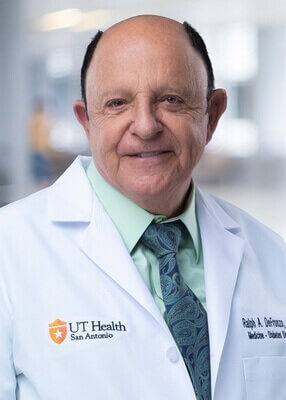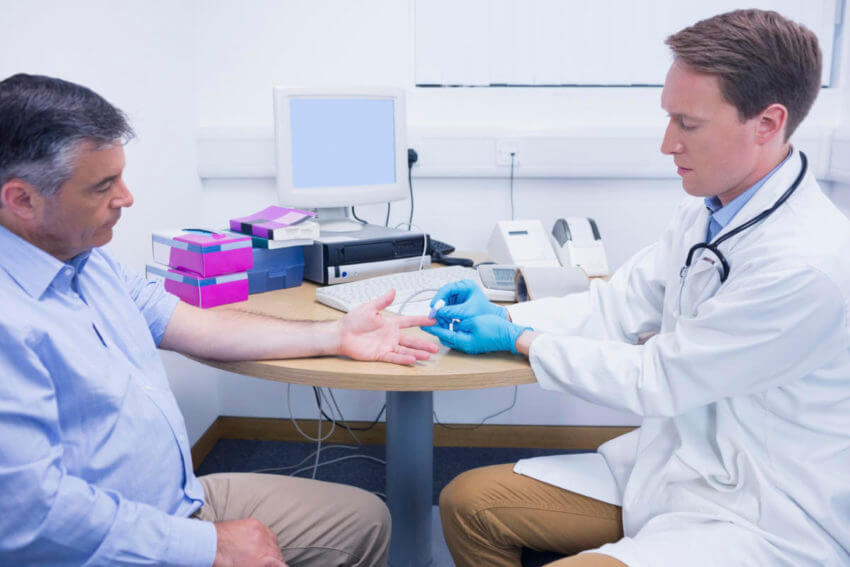Metformin, SGLT-2 inhibitors and insulin resistance among career highlights
Contact: Will Sansom, 210-567-2579, sansom@uthscsa.edu
SAN ANTONIO (Nov. 29, 2022) — Ralph A. DeFronzo, MD, professor of medicine at The University of Texas Health Science Center at San Antonio (UT Health San Antonio) and deputy director of University Health’s Texas Diabetes Institute, will receive one of the world’s most prestigious prizes, the Prince Mahidol 2022 Award in Medicine, the health science center announced today.

DeFronzo, a world-renowned leader in the field of type 2 diabetes, will accept the award from King Maha Vajiralongkorn of Thailand in a ceremony Jan. 26, 2023, at the Royal Palace in Bangkok.
DeFronzo will be honored for his innovative, decades-long research that has increased understanding of the causes and treatment of type 2 diabetes mellitus and improved the health of diabetic patients worldwide. The Prince Mahidol Award is presented to a medical luminary who has made major scientific contributions that have had a global effect on society.
The Lancet published an announcement of the Mahidol Award winners. “No one individual has done more to demonstrate the multifaceted nature of type 2 diabetes than Ralph DeFronzo,” wrote the journal’s Talha Berki.
A global thought leader
“Ralph DeFronzo’s delineation of the ‘ominous octet’ in type 2 diabetes is used by everyone in the world, no matter where you go,” said James R. Gavin III, MD, PhD, endocrinologist and clinical professor of medicine at the Emory University School of Medicine and the Indiana University School of Medicine. “If you attend a talk in Israel or a presentation in Germany, everyone speaks about it.”
Stefano Del Prato, MD, professor of endocrinology and metabolism at the University of Pisa School of Medicine and president of the European Association for the Study of Diabetes, said the Prince Mahidol Award “is a recognition that once more makes Dr. DeFronzo a giant in medicine.”
In a recent meeting of Middle Eastern and North African countries in Tel Aviv, Israel, Itamar Raz, MD, professor and director emeritus of the Diabetes Unit at Hadassah Hospital, head of the Israeli National Council of Diabetes and leader of the Israel National Diabetes Prevention Plan, called DeFronzo the “father of current-day diabetes.” Guang Ning, MD, PhD, professor and director of the Department of Endocrine and Metabolism in Ruijan Hospital and director of the Shanghai Institute for Endocrinology and Metabolism, said DeFronzo’s landmark studies on the pathophysiology of type 2 diabetes and the ominous octet are known to all endocrinologists in China.
In 2009 in the journal Diabetes, DeFronzo noted that muscle, liver, beta cells, fat cells, the gastrointestinal tract, alpha cells, the kidneys and brain all play important roles in the development of glucose (sugar) intolerance in type 2 diabetic individuals. Collectively, he said, these eight players comprise the “ominous octet” and dictate that:
- A combination of drugs will be required to correct the multiple defects.
- Treatment should be based on reversal of known abnormalities and not simply on reducing hemoglobin A1c percentage. (Hemoglobin A1c is a blood test that measures average glucose levels over the past three months.)
- Therapy must be started early to slow beta cell failure in subjects who exhibit impaired glucose tolerance. (Insulin, which lowers blood sugar, is only made by beta cells. In type 2 diabetes, beta cells fail and insulin decreases. At the same time in type 2 diabetes, the body doesn’t use insulin efficiently.)
A novel oral drug therapy
In 1995, aside from insulin, the medical community had only one other approved treatment for type 2 diabetes — a class of oral drugs developed in the 1950s called sulfonylureas. But a new drug, metformin, was coming to center stage.
Metformin’s major mechanism of action is in the liver, where it decreases hepatic glucose production. DeFronzo and colleagues conducted research that led to the drug being approved by the U.S. Food and Drug Administration. “This was an enormous breakthrough,” DeFronzo said.
But more drug treatments were needed, and DeFronzo’s research soon pointed to other possibilities.
Adding to the armamentarium
“Ralph originated the concept of translating the SGLT-2 inhibitor class of drugs from pre-clinical science to the clinical setting. His team did early studies to show that these drugs are effective in treating type 2 diabetes,” said Katherine Tuttle, MD, nephrologist, executive director for research at Providence Health Care, and professor of medicine at the University of Washington in Spokane. Tuttle completed a nephrology fellowship at UT Health San Antonio.
The first SGLT-2 inhibitor approved in the world was dapagliflozin in 2012 in the United Kingdom, and U.S. approval followed in January 2014. DeFronzo played a central role in working with Astra Zeneca to introduce dapagliflozin into the U.S. market. These drugs target the sodium glucose cotransporter 2 and inhibit glucose reabsorption in the kidneys. A greater amount of sugar is eliminated in the urine.
“Dr. DeFronzo predicted that SGLT-2 inhibitors would protect the kidneys, and in fact, dapagliflozin was the first new drug approved for slowing chronic kidney disease in people with and without diabetes in more than 20 years,” Tuttle said. “It also reduces risk of heart failure in people with and without diabetes or kidney disease.”
Understanding the body’s response to insulin
DeFronzo and the late Gerald Reaven, MD, of Stanford University School of Medicine, are the fathers of the insulin resistance syndrome.
“The proof for this concept came with Dr. DeFronzo’s development of the insulin clamp, which is the gold standard for measuring insulin sensitivity,” James Gavin said. DeFronzo invented this technique in 1975 and described it in a 1979 article in the American Journal of Physiology.
“Dr. DeFronzo’s pioneering studies conclusively demonstrated the pivotal role of insulin resistance in the development of type 2 diabetes, and the strong association between atherosclerotic cardiovascular disease, insulin resistance and diabetes,” Gavin said.
A multiyear study of 318 people called EDICT, conducted at the Texas Diabetes Institute, was published in the journal Diabetes Care in 2021. The EDICT findings supported DeFronzo’s assertion that prescribing multiple drugs in combination at the beginning of a patient’s care is superior to the standard practice of starting with a single drug and moving to another as the type 2 diabetes progresses.
The study took six years to complete because participants were followed in their care and outcomes for three years.
“In 2022, for the first time, American Diabetes Association standards of care called for combination therapy,” DeFronzo said. “Only two studies were quoted, our EDICT study and a second study called VERIFY. This change in standards is based on our defining the multiple causes of type 2 diabetes and understanding what drug therapies should be used.”
Career biosketch
DeFronzo graduated from Yale University with a degree in biology and biochemistry before going on to Harvard Medical School. Following internal medicine training at Johns Hopkins, he completed fellowships in endocrinology (National Institutes of Health and Baltimore City Hospital) and nephrology (Hospital of the University of Pennsylvania). He holds the Joe R. and Teresa Lozano Long Distinguished Chair in Diabetes in the Long School of Medicine at UT Health San Antonio, where he has been on the faculty since 1988.
In 1987 DeFronzo received the Lilly Award from the American Diabetes Association (ADA) as the outstanding young investigator. In 2002 he received the Albert Renold Award from the ADA for the training of more than 250 young diabetes investigators. In 2005 he received the Novartis Award at the Annual Scientific Meeting of the ADA as the outstanding clinical investigator worldwide.
In 2008 DeFronzo won the Banting Award from the ADA and the Claude Bernard Award from the European Association for the Study of Diabetes (EASD). These are the highest scientific awards given by the ADA and EASD and no person ever has received both of these awards in the same year. DeFronzo was awarded honorary membership in the EASD in 2022 for his lifetime achievements in the field of diabetes and metabolism.
In 2017 DeFronzo won the Harold Hamm International Prize for Biomedical Research in Diabetes, which included a $250,000 cash prize. DeFronzo is the author of more than 850 publications in peer-reviewed journals and is the editor of the International Textbook of Diabetes Mellitus.
About the Prince Mahidol Award
His Royal Highness Prince Mahidol, born in 1892, is called the “Father of Modern Medicine and Public Health of Thailand.” A Harvard-educated physician, he taught preventive and social medicine to students after returning to his homeland. He died of kidney disease in 1929 at the young age of 37. The award that bears his name was established in 1992 during the year of his birth centennial.
The Prince Mahidol Award has been presented to more than 80 Laureates, including in 2013 to Anthony Fauci, MD, longtime director of the U.S. National Institute of Allergy and Infectious Diseases. Fauci has advised seven presidents on infection control in response to threats such as HIV/AIDS and COVID-19. The Human Genome Project, which was conducted in six countries worldwide, also received the Prince Mahidol Award.
Winners are nominated by peers, and an international board of judges extensively reviews the nominations for merits before narrowing down to the winners.
“The Prince Mahidol Awards in the fields of public health and medicine are among the most prestigious awards in the field of medical sciences. Several Prince Mahidol Award winners later went on to win Nobel Prizes or head global organizations such as the World Health Organization (WHO),” according to an article by the Royal Thai Embassy in Washington, D.C.
DeFronzo has trained diabetes researchers in Italy, Turkey, Saudi Arabia, Sweden, Finland, Denmark, Spain, Mexico, Argentina, Iran, Brazil, China, Thailand, Germany, Canada, Israel, Ukraine, Korea, Egypt, India, Iraq, Syria, Ireland, Kosovo, Poland, the Netherlands, Japan, New Zealand, the United Kingdom and the United States.
The University of Texas Health Science Center at San Antonio (UT Health San Antonio) is a primary driver for San Antonio’s $42.4 billion health care and biosciences sector, the city’s largest economic generator. As the largest research university in South Texas, with an annual research portfolio of approximately $350 million, UT Health San Antonio drives substantial economic impact through its five professional schools, a diverse workforce of 7,200, an annual operating budget of more than $1 billion and a clinical practice that provides more than 2 million patient visits each year. Furthermore, UT Health San Antonio plans to add more than 1,500 higher-wage jobs over the next five years to serve San Antonio, Bexar County and South Texas. To learn about the many ways “We make lives better®,” visit www.uthscsa.edu.
Stay connected with The University of Texas Health Science Center at San Antonio on Facebook, Twitter, LinkedIn, Instagram and YouTube.
About University Health
University Health is San Antonio’s only locally owned health system and the only academic medical center in South Texas. Its University Hospital serves as the region’s Level I trauma center for adults and children. Outpatient care is provided through a comprehensive network of urgent, primary and specialty care centers. For more than 100 years, University Health has been committed to delivering compassionate, culturally competent and high-quality healthcare, based on a strong foundation of outcomes‐based research and innovative teaching. Learn more at UniversityHealthSystem.com. Follow us on Twitter and Facebook.
Gain insight into effective treatments and health trends through our blog HealthFocusSA.


